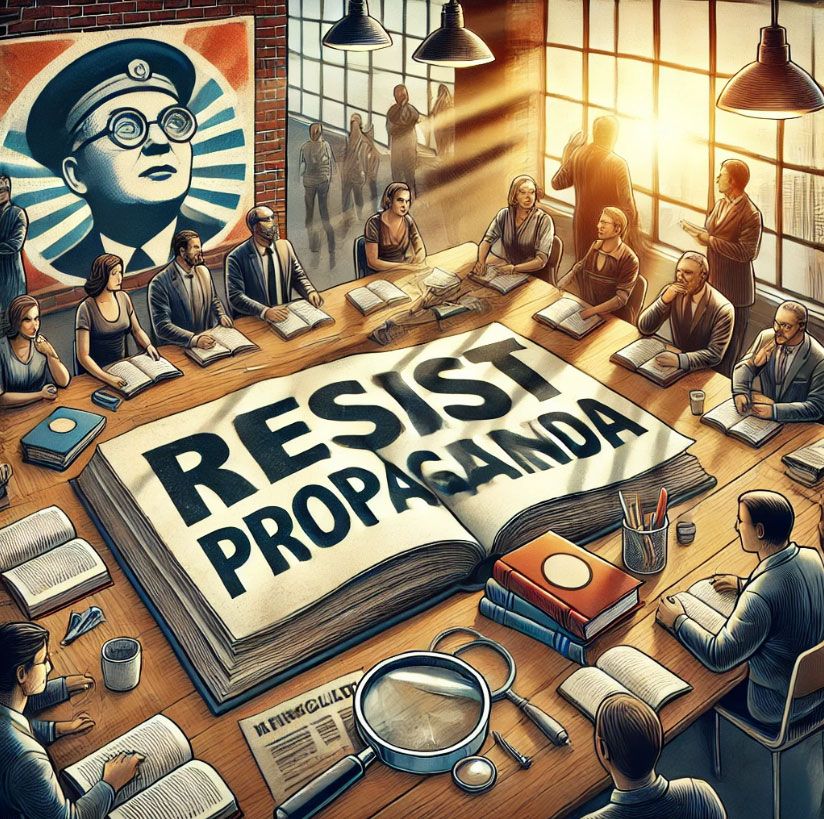The Values That Combat Propaganda
Transparency
Corrosive propaganda thrives in the shadows of secrecy. Civil society must champion open governance and demand access to accurate information. Transparency ensures that narratives are grounded in truth, giving citizens the tools to verify claims and resist manipulation.
Governments, institutions, and media organizations should prioritize accountability and make efforts to share information openly.
Pluralism
Diversity in thought and discourse is a powerful defense against propaganda. When multiple perspectives are represented in public dialogue, the monopolization of narratives becomes far more difficult.
Supporting independent voices—whether in journalism, academia, or the arts—creates a vibrant, pluralistic society resistant to disinformation.
Critical Thinking
Propaganda often exploits ignorance and cognitive biases. Cultivating critical thinking skills helps individuals question narratives, evaluate sources, and engage in reasoned analysis. Education systems play a vital role in equipping citizens with the ability to discern fact from fiction.
Empathy and Humanity
Propaganda’s most insidious function is its ability to dehumanize. By fostering empathy and emphasizing shared human dignity, societies can counteract efforts to sow division and hatred. Celebrating common humanity helps rebuild trust and solidarity.
Justice and Accountability
Civil society must uphold justice and ensure that perpetrators of propaganda-driven violence are held accountable. International norms and mechanisms should be strengthened to address disinformation as a tool of oppression and violence, reinforcing the principle that crimes against humanity will not go unanswered.
Methods to Reverse the Damage
Media Literacy Campaigns
One of the most effective ways to counter propaganda is by teaching people to recognize and resist it. Media literacy campaigns can educate individuals on identifying biased or false information, verifying sources, and understanding the tactics of disinformation.
Social media platforms can play a role by integrating fact-checking tools and promoting credible content.
Supporting Independent Media
Independent journalism is a cornerstone of a free society. Supporting investigative reporting, providing legal protections for journalists, and ensuring the survival of independent media outlets are crucial steps in combating propaganda.
Funding and resources for journalism should prioritize transparency and fact-based reporting.
Encouraging Open Dialogue
Propaganda thrives in polarized environments where opposing views are vilified.
Creating forums for constructive debate and discussion allows individuals to understand different perspectives, reducing the appeal of oversimplified and polarizing narratives.
Technological Safeguards
As propaganda increasingly operates in the digital realm, technological solutions must evolve. Algorithms and tools can be developed to detect and limit the spread of disinformation.
Social media platforms should prioritize transparency in how their systems operate, particularly regarding bots and paid content.
Investing in Civic Education
Civic education helps individuals understand their rights, responsibilities, and the mechanisms of governance.
Teaching citizens how propaganda works—and how to resist it—empowers them to participate actively in democratic processes and reject authoritarian manipulation.
Strengthening International Collaboration
Disinformation campaigns often transcend national borders. Civil society organizations, governments, and international bodies must collaborate to expose and counter propaganda globally. Norms and treaties that hold states accountable for spreading disinformation should be reinforced.
Highlighting Historical Lessons
History provides powerful examples of propaganda’s destructive potential. Educational initiatives can use events like Soviet-era purges or Nazi propaganda to illustrate the dangers of unchecked disinformation, ensuring these lessons resonate with future generations.
Using Art and Culture as Resistance
Art has historically been a means of resisting propaganda and amplifying truth. Promoting cultural expression—whether through literature, film, or visual art—offers alternative narratives that inspire and empower society to challenge manipulation.
Building Resilience Against Future Propaganda
Strengthening Democratic Institutions
Robust institutions—characterized by fair elections, press freedom, and judicial independence—form the backbone of societies resilient to propaganda. Laws protecting these institutions must be upheld, ensuring that truth and accountability prevail over coercion and manipulation.
Promoting Global Digital Literacy
Digital platforms are the primary battlegrounds for modern propaganda. Global efforts to teach digital literacy, particularly in vulnerable populations, can help individuals navigate the digital landscape with greater discernment.
Encouraging Ethical Leadership
Ethical leadership is a natural counter to propaganda. Leaders must be held to high moral standards, with an emphasis on integrity, honesty, and a commitment to serving the public. Trustworthy leadership builds societal resilience against manipulation.
Developing Early Warning Systems
Monitoring and predicting disinformation trends allows civil society to respond proactively. Early warning systems can alert governments and communities to emerging propaganda threats, enabling swift countermeasures.
Actionable Steps for Individuals
- Question the Source: Always ask: Who benefits from this narrative? Verify facts through multiple reputable sources before accepting them as truth.
- Avoid Sharing Unverified Information: Sharing misinformation amplifies its impact. Think critically before reposting or sharing content online.
- Engage in Constructive Dialogue: Seek conversations with people holding diverse perspectives. Open discussions reduce polarization and help build understanding.
- Support Independent Media: Subscribe to trustworthy news outlets and promote investigative journalism that prioritizes transparency and accountability.
- Be an Advocate for Transparency: Demand openness from governments and organizations. Participate in campaigns that promote access to reliable information and accountability.
Conclusion
The battle against propaganda is a struggle for truth, justice, and humanity. By upholding values like transparency, critical thinking, and empathy, civil society can reverse the damage caused by disinformation and build resilience against its recurrence. History’s lessons are clear: propaganda thrives where ignorance and fear prevail. The antidote lies in fostering education, promoting justice, and creating spaces for open dialogue and diverse expression.
Propaganda may offer regimes short-term control, but it ultimately weakens and destroys. A united, informed, and resilient society can ensure that truth and humanity triumph over manipulation and coercion.















